We offer here a robust collection of sample messages for social media, articles, signs, and chants for the Teach Truth Day of Action and all year long. Feel free to use or adapt these and write your own. Share them as text, graphics, or a short video.
Messages
These sample messages are from (1) Guide to Counter-Narrating the Attacks on Critical Race Theory by our cosponsors at Race Forward, (2) GLSEN talking points, and (3) Zinn Education Project staff. They are sorted by broad themes.
We begin with the response from an educator about why he is hosting a day of action event:
I am hosting this event:
For students, who deserve to learn accurately about our past and present. They deserve all the tools we can provide them to help them think critically about the world, so that they might be engaged citizens in it.
Systemic Racism and Education
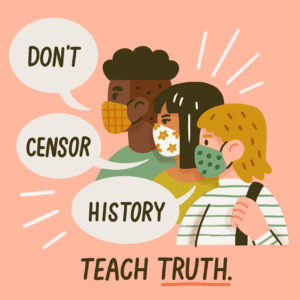
Find graphics on this page.
- We all deserve an honest education about racism in this country
- Systemic racism is real
- Learning about the history of race and how it informs our present helps us all become wiser and stronger
- Politicians are using a caricature of critical race theory to rob us of our history and the knowledge to solve our biggest challenges
- Addressing the harmful impact of systemic racism will benefit us all
- Systemic racism describes how laws and institutions (e.g., schools, hospitals, workplaces, etc.) have discriminated against people of color, whether intentionally or not
- Systemic racism explains the differences in opportunities and outcomes across race
- There is no way to understand the profound inequality of wealth in the United States without looking at this country’s history of racism
- We solve problems by having honest and courageous conversations about them — and then taking action
- We value an honest education about race and racism in this country
- It may be easier to deny or avoid our challenges, but that is never how we overcome them
- Learning about systemic racism — within our neighborhoods, in our schools, and in our workplaces — is the first step in healing our divisions so that we can solve problems that harm us
- Learning about the history of race and how it impacts our present helps us all grow stronger, wiser, and more able to solve our current-day problems
- Having honest and courageous conversations about systemic racism helps us achieve the promise of racial equity
- We achieve racial equity when a person’s race no longer determines the opportunities in their life; because of systemic racism, it often does, to the detriment of us all
- Advancing racial equity will benefit us all, strengthening our neighborhoods, our cities, and our states
- We all deserve an honest education about racism in this country
- Systemic racism is real
- Learning about the history of race and how it informs our present helps us all become wiser and stronger
- Politicians are using a caricature of critical race theory to rob us of our history and the knowledge to solve our biggest challenges
- Addressing the harmful impact of systemic racism will benefit us all
- Systemic racism describes how laws and institutions (e.g., schools, hospitals, workplaces, etc.) have discriminated against people of color, whether intentionally or not
- Systemic racism explains the differences in opportunities and outcomes across race
- There is no way to understand the profound inequality of wealth in the United States without looking at this country’s history of racism
- We solve problems by having honest and courageous conversations about them — and then taking action
- We value an honest education about race and racism in this country
- It may be easier to deny or avoid our challenges, but that is never how we overcome them
- Learning about systemic racism — within our neighborhoods, in our schools, and in our workplaces — is the first step in healing our divisions so that we can solve problems that harm us
- Learning about the history of race and how it impacts our present helps us all grow stronger, wiser, and more able to solve our current-day problems
- Having honest and courageous conversations about systemic racism helps us achieve the promise of racial equity
- We achieve racial equity when a person’s race no longer determines the opportunities in their life; because of systemic racism, it often does, to the detriment of us all
- Advancing racial equity will benefit us all, strengthening our neighborhoods, our cities, and our states
Anti-history education campaign
- Today, some politicians want to ban the conversations about race we are having in classrooms, workplaces, and in government
- These attacks use a caricature of critical race theory to distract and divide us from addressing real problems in our society. Instead of supporting people after a devastating pandemic, they are wasting time trying to ban conversations about systemic racism — conversations that would actually help us unite to solve our country’s biggest challenges
- “They are attacking critical race theory as both cover and justification for the wave of voter suppression bills making their way through state legislatures across the country. This attack on critical race theory is part of a broad, coordinated effort to thwart a multiracial democracy.” — Rethinking Schools
- They want to distort the truth and sanitize history at a time when awareness of systemic racism is growing as a result of the historic uprisings against police brutality
- They insist that talking about race is “divisive,” but that is a lie designed to rob us of our history and deny us the knowledge that will help us unite to build a more just and inclusive world — a world in which one’s race does not limit your opportunity and achievements in life
- These attacks draw from the oldest playbook in U.S. politics. Politicians use fear of people of color, immigrants, or LGBTQ people to breed resentment so that they can retain power and dominance at a time when a multiracial, pluralistic majority is emerging in this country
Supporting trans students
From GLSEN
- Trans and LGBTQ+ youth are watching, and when politicians and pundits set the example that harassing transgender people is ok, it sends a message that trans youth are unsafe
- Anti-LGBTQ+ extremists are pushing problematic narratives and misinformation about hypothetical issues in order to spread confusion and distract us. Now more than ever it is critical for us to rise up to support, not scrutinize, trans and queer students
- All students, including transgender students, deserve to feel safe, comfortable and supported in their schools so they can focus on their education
- Supportive educators are an essential resource for young people, especially transgender and queer youth who may feel isolated or unsafe
- It’s devastating to see politically motivated attempts to break trust between students and educators and to force educators to violate students’ privacy by outing them to guardians
- This kind of hostile school climate puts trans youth at greater risk of harassment, mental health challenges, and discrimination. Transgender and nonbinary students need respect and autonomy, not additional scrutiny and policing of their gender identity in school
“Don’t Say Gay” bills
From GLSEN
- There’s a lot of overlap between the so-called “Don’t Say Gay” laws, like the one in Florida, and the anti-CRT attacks on Black students and other students of color
- Our research shows that these curriculum censorship laws only further harass Black queer students who are already some of our most persecuted and disenfranchised youth. GLSEN’s 2019 National School Climate Survey reveals that two out of every five Black LGBTQ students experience harassment or assault at school. Black LGBTQ+ youth are more likely to skip school due to feeling unsafe, have lower GPAs and academic achievement, and report less of a sense of belonging in school when they experience hostile school environments and are denied access to inclusive curriculums and other supports
- However you look at it, Black queer young people are essentially being told that they don’t belong, that they shouldn’t exist and that their communities and identities aren’t valid. All Black students, particularly Black queer youth, deserve to attend schools that are secure, accepting places where they may learn and develop without feeling threatened or harassed
- Inclusive school curriculum can act as a window for young people into the diverse world around them, as well as a mirror to reflect their own experiences and identities. All students benefit from seeing accurate representation of the diversity that makes our multicultural democracy so important. Learning to understand and respect different people of different backgrounds helps prepare students to participate in our society and be stronger leaders for equity and progress for all
- School leaders must do their part to invest in support for educators and students, whether it’s through educator training or resources for GSAs. When students see their teachers as being supportive, it can significantly improve their academic performance, psychological well being, and long-term educational goals. Supportive adults in schools can help provide guidance and resources to students, and make a big difference in creating a safe and encouraging environment for both students and other teachers
Inclusive education
From GLSEN
- When we give our students access to supportive, inclusive, and truthful education, they thrive
- Our research demonstrates that LGBTQ+ youth are more likely to skip school due to feeling unsafe, have lower GPAs and academic achievement, and report less of a sense of belonging in school when they experience hostile school environments and are denied access to supportive teachers and inclusive curriculums
- LGBTQ+ youth who attend schools with inclusive curriculum have higher GPAs, a greater sense of belonging, are more likely to pursue post-secondary education, along with many other benefits that promote long-term wellbeing and achievement
- We must rise up for LGBTQ+ youth and keep advocating for inclusive education that promotes a safe and healthy environment for all of us
Education as the cornerstone of democracy
From GLSEN
- Education that is inclusive and accurately represents the diverse world around us helps all students — whether LGBTQ+ or not — learn how to engage in our multicultural democracy
- Erasing LGBTQ+ issues from classrooms jeopardizes the foundation of our democracy
- Every student in our country, including our LGBTQ+ youth, is deserving of quality inclusive education in safe and empowering school environments, regardless of radical politicians’ ill-fated attempts to play politics with our children’s futures
- Without supportive and representative education, our country can never achieve the democratic ideals we aspire to
- Education should equip young people with the knowledge they need to drive change in policy and in culture, and foster the confidence and compassion needed to pursue transformation in their communities
- Education should inspire political activism and civic engagement in all of us. Especially at this moment, when our country is facing such vocal extremism, we must invest in our future by investing in our students’ education
Anti-trans bathroom bills
From GLSEN
- According to GLSEN research, 60 percent of transgender students report having been prohibited from using the bathroom or locker room that aligns with their gender identity
- These bills hurt students’ academic achievement — and the educators held accountable for students’ success
- Discriminatory policies affect more than just grades: LGBTQ+ students who experience discrimination, like being prohibited from using the restroom, report higher levels of depression and lower self-esteem
- Enforcing these bills would be prohibitively expensive and time-consuming for schools and extraordinarily invasive toward transgender students
Book bans
From GLSEN
- All students benefit from seeing accurate representation of the diversity that makes our multicultural democracy so important. Learning to understand and respect different people of different backgrounds helps prepare students to participate in our society and be stronger leaders for equity and progress for all
- When we give our students access to supportive, inclusive, and truthful education, they thrive
- Book bans are a part of a larger attack on the LGBTQ+ community from right-wing extremists
- Inclusive school curriculum — including access to books about LGBTQ+ people — can act as a window for young people into the diverse world around them, as well as a mirror to reflect their own experiences and identities
- We must speak out against bills that include book bans and vote for down-ballot candidates like school board members and state legislators who support inclusive education
Parental support
From GLSEN
- Research shows that when students have the full support of their family, they thrive
- Recently, House Republicans introduced a “Parents Bill of Rights,” a blatant political stunt that includes significant and costly bureaucratic burdens that would take more time away from learning and cause direct harm to LGBTQ+ and BIPOC students
- This bill would authorize intense parental oversight and micromanagement in public schools without any guardrails, including effectively eliminating anonymous surveys by allowing parents to request their child’s responses
- It also includes burdens that would take time away from school mental health professionals serving students — increasing barriers to access at a time when there is a youth mental health crisis
- No student should have to face being outed to families by their teachers or school administrators
- Being outed could put students at risk of harm, and every student has a right to come out at a time of their choosing
Solutions
- We know better than to give into lies that prevent us from learning our country’s true racial history and how it shapes our lives today
- History shows that when we work together across our differences, we accomplish great things for ourselves, our loved ones, our neighbors, and our children
- History also shows that every time we made progress on race as a country, there has been a backlash. These attacks are in response to a growing movement of people who want to play their part in addressing systemic racism
- We must not be “colorblind” to the reality of systemic racism. Instead, we must be “race-conscious” in our efforts to understand and fix our country’s problems. That means directly addressing the harm that systemic racism has caused to people of color
- There is benefit for everyone in addressing systemic racism. By having honest and courageous conversations about systemic racism, people of all backgrounds have come to a deeper understanding of themselves, developed stronger connections with their neighbors, and have found purpose in doing their part to build a more fair and inclusive world
- As these attacks against discussing race continue and escalate, now is a vital time to express our support of learning about systemic racism — in our neighborhoods, classrooms, and workplaces
- We refuse to return to the hysteria and paranoia of the McCarthy era, and we won’t let them use race, gender, and sexuality to divide and conquer us
Sign Ideas
This list was prepared by a group of educators in Portland, Oregon — with additions from the Zinn Education Project team.
|
White supremacy is divisive I will not indoctrinate my students with White supremacy Systemic Racism IS the Truth Racism = Hate; Teaching about Racism = Love Love Requires Truth Educators for Truth I refuse to Lie I refuse to lie to my students Ignorance = Hate Teach Truth Pledge to teach the truth! The truth will set us free School: a place to think We, the teachers, say no to censorship & intimidation Educators Rejecting Censorship Teachers keep on teaching The truth: essential tenet of a democracy Truth: Essential to Democracy Silence = Violence Normalize Truth Telling We, the teachers, refuse to be intimidated/silenced McCarthy Era all over again? Hell no! The truth over white feelings/tears Refuse Revisionism Which side are you on? Whose side are you on? Can’t be neutral on a moving train Good teachers teach multiple perspectives. Take it or leave it Criticality is the most important skill teachers teach We teach criticality, not ideology We teach critical thinking, not conformity Criticality over conformity #TeachTruth Teachers won’t be bullied. We will not be silenced. We owe it to the children The truth hurts. So what? No pain, no gain. This white teacher is not threatened by the truth Collectively we construct a new tomorrow Ask me about the Revolution Truth? I like it! Say no to legislating lies! Codify lies? Why? Who’s afraid of the truth? Teach the truth because perpetuating past wrongs is just… wrong Truth = clarity The kids deserve nothing but the truth Lies are outdated, truth is in! We love our truthtelling teachers! We stand with the truthtellers! It’s about time for the truth!/It’s about time to tell the truth! Lies are for liars & deniers Better hard truth than a lie/ life built on lies The kids can spot a lie from a mile away |
Recognizing Mistakes is Necessary for Learning Refusing to Acknowledge Failure Lying to children is for cowards Cowards Lie to Children Comfort or Truth — Make Your Choice Yesterday’s truth means better tomorrow Why lie? Face the truth and move on/forward! Honesty not travesty Truth → Transformation Truth over propaganda So what do we want? A revolution! Hell yes we want a revolution! Strong enough to face the truth! Truth about history fuels change! Truth fuels change! United for democratic schools! United for academic freedom! The kids can handle the truth. It’s the adults!/The adults? Students can handle Truth. Can you? Injury to one (teacher) is injury to all Can you stand the truth? Why hide the truth when we can learn/grow from it? Ideological censorship will not be tolerated! I’m white and I can handle the truth! No true learning or understanding without the truth The truth is the mirror America/the U.S. needs Honor learning as exploration/True learning is exploration, not regurgitating prescribed facts Hide from the truth and it will bite you in the ass The children want to know Legislating against teaching about structural racism is structural racism. Why is ending racism such a debate? Resist! We Will Not Be Silenced You won’t legislate equal funding for schools, but will legislate that you can’t teach about racism. Can’t burn all the books in the world even if you try Don’t give into the anti-teacher propaganda Don’t give into the propaganda Blaming the teachers? We don’t buy it! Young people have minds of their own. What a concept! Hide the truth and the kids will demand it! Hiding the truth from kids is like hiding presents they know are coming Stop the witch hunts against anti-racist teachers! Be brave with us/me! Scared of the truth? I’m here to help Honesty is the best policy Teachers rising up Censorship? No thanks. I learned about it in history class! Not a fan of censorship Censorship? Not a fan. Public schools are the cornerstone of our democracy. Resist the slander!/smears! Resist the anti-teacher propaganda! |
|
Chants
Listen to a sample audio mp3 for the chants
- Teach Truth —- No More Lies
- Teachers (people/parents/students) United — will (or we’ll) never be defeated
- Censorship? No thanks! I learned about it in history class!
- What do we want? Truth. Where do we want it? In our schools.
- You can’t run, you can’t hide. History is on our side.
- The truth, The truth! The truth will set us free.
- We’re here, we’re strong. We’ll tell the truth the whole year long.
- So what do we want? A revolution! When do we want it? Now!
(To the tune “If you’re Happy and you Know it)
If you refuse to be bullied, CLAP your hands (Clap twice, 1, 2)
If you refuse to be bullied, CLAP your hands
If you refuse to be bullied, and you believe in truth fully
If you refuse to be bullied, CLAP your hands
If you pledge to teach the truth, STOMP your feet (Stomp twice 1, 2)
If you pledge to teach the truth, STOMP your feet
If you pledge to teach the truth and you won’t let down our youth
If you pledge to teach the truth STOMP your feet
Graphics
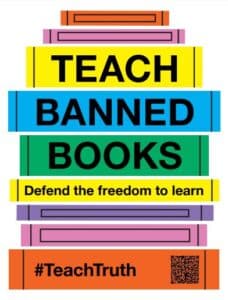 We offer graphics that you can use as is or customize.
We offer graphics that you can use as is or customize.
Click the image to find dozens more. Or make your own!
Story Prompts
Click the images to find a variety of story prompts along with an instructional video produced by EJ-ROC at NYU Metro Center.
Donate
Make a donation so that we can continue to defends teachers and provide resources to teach people’s history.
Thank you for supporting the right to #TeachTruth.



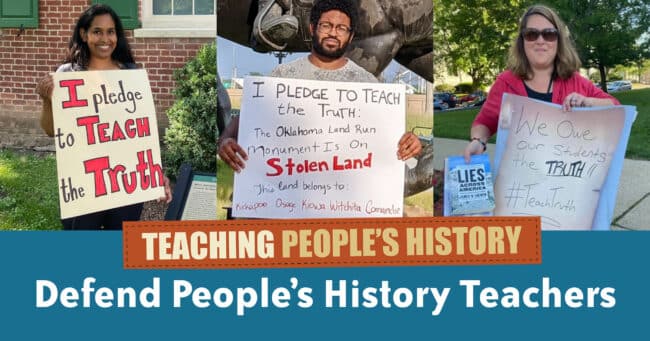
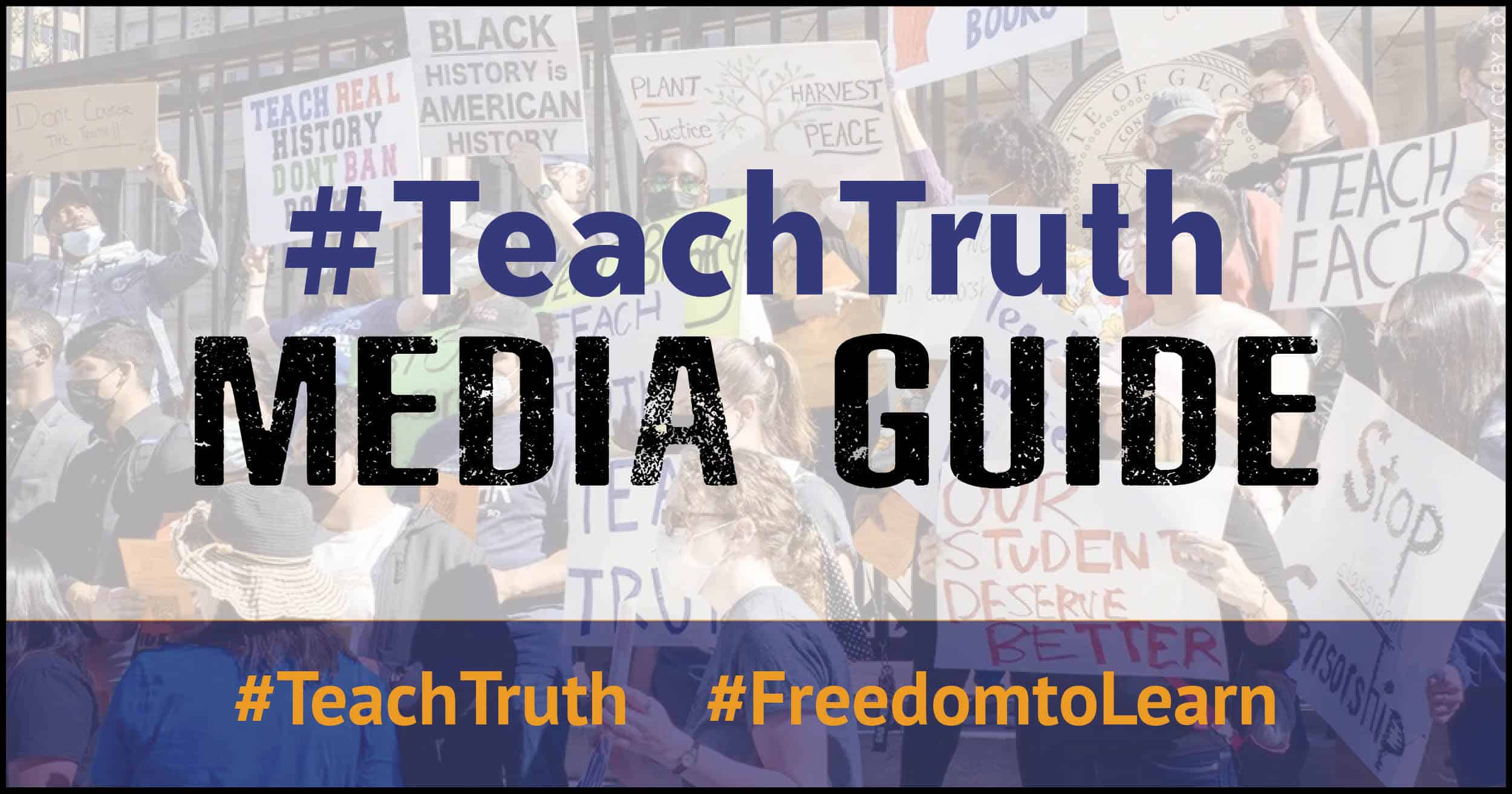
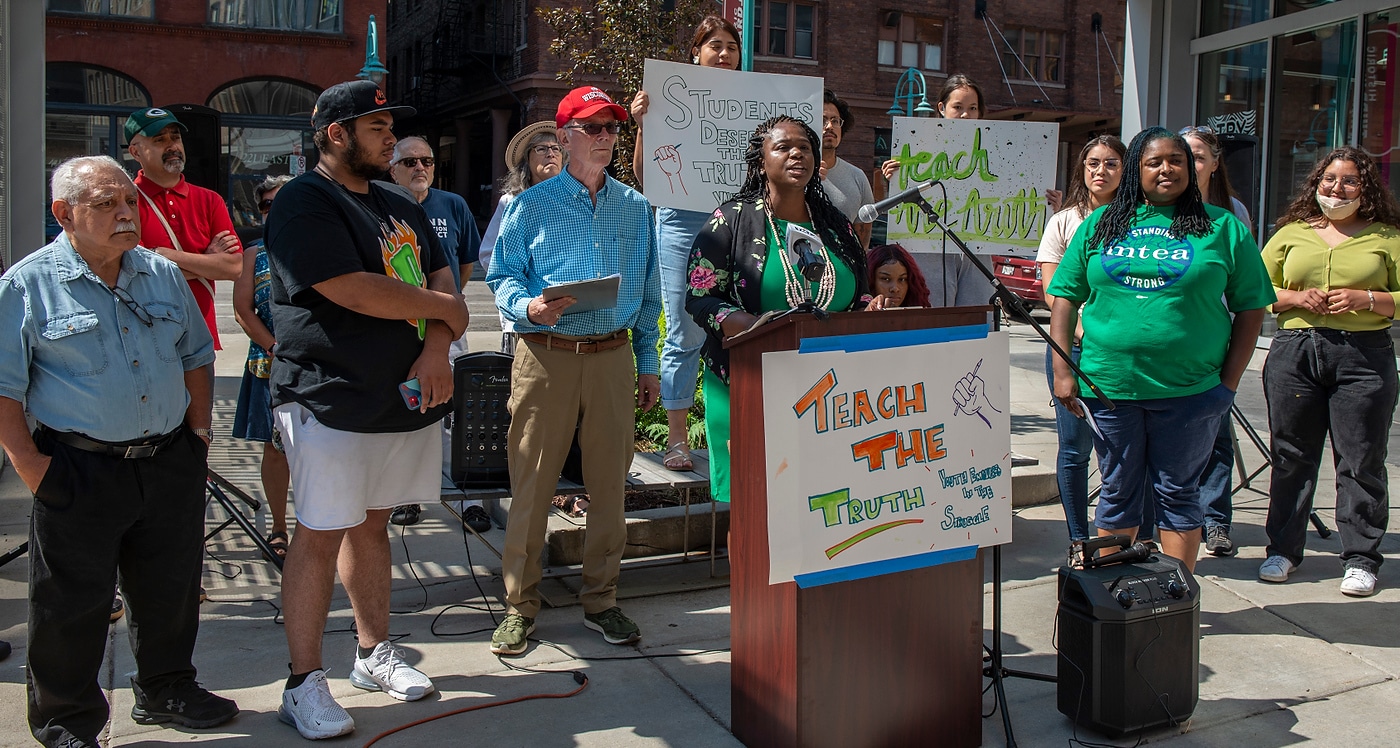
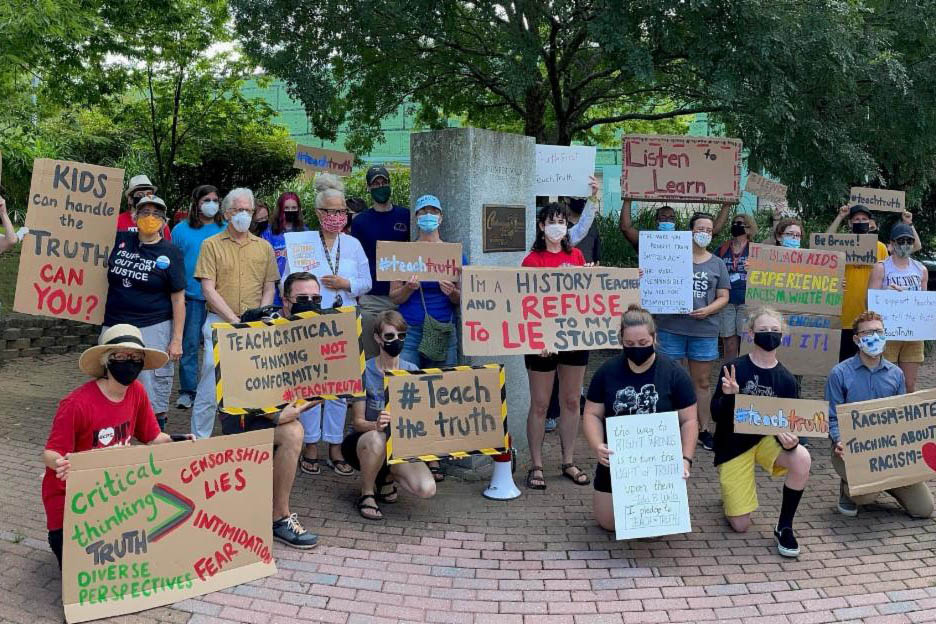
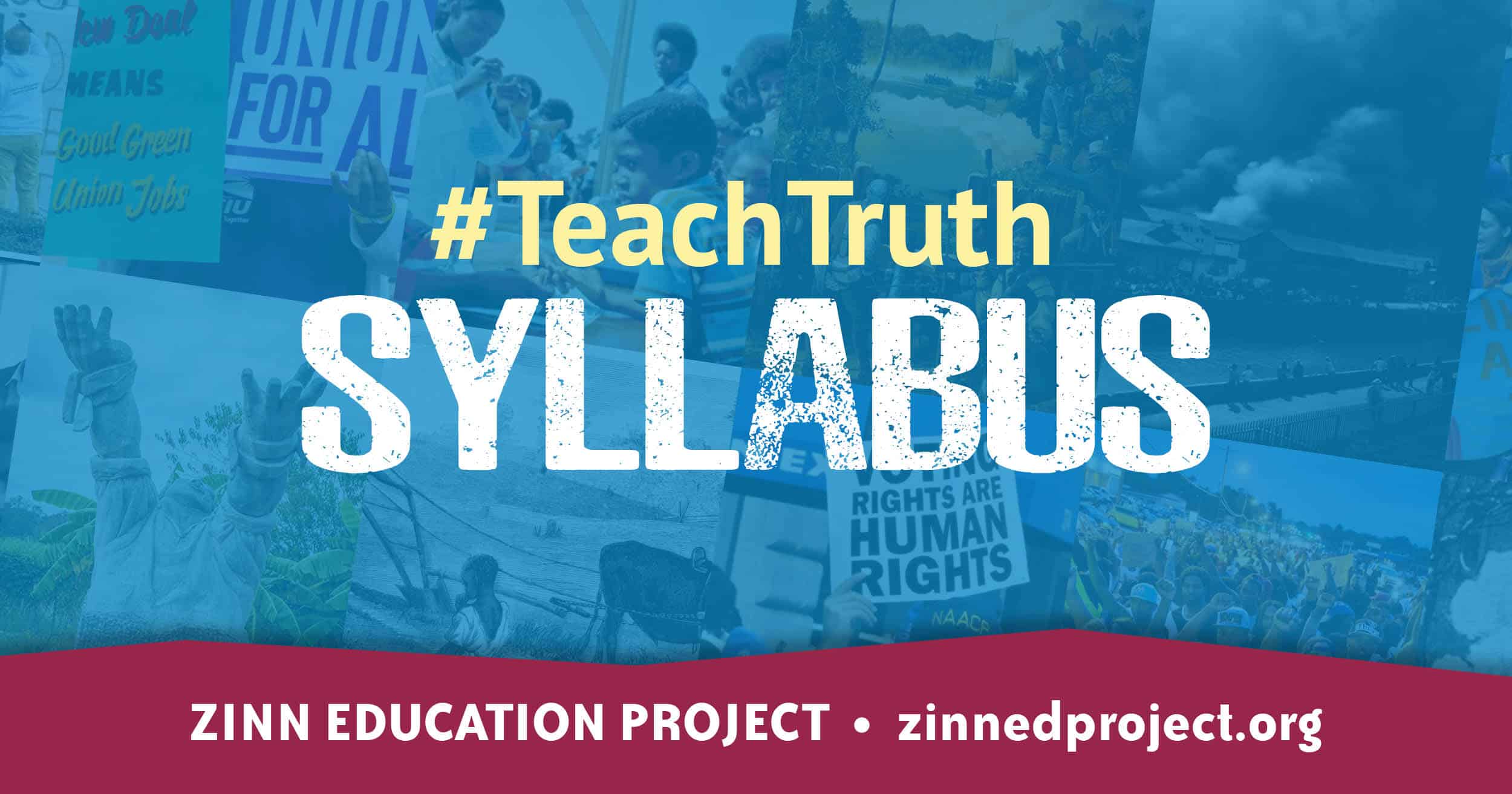
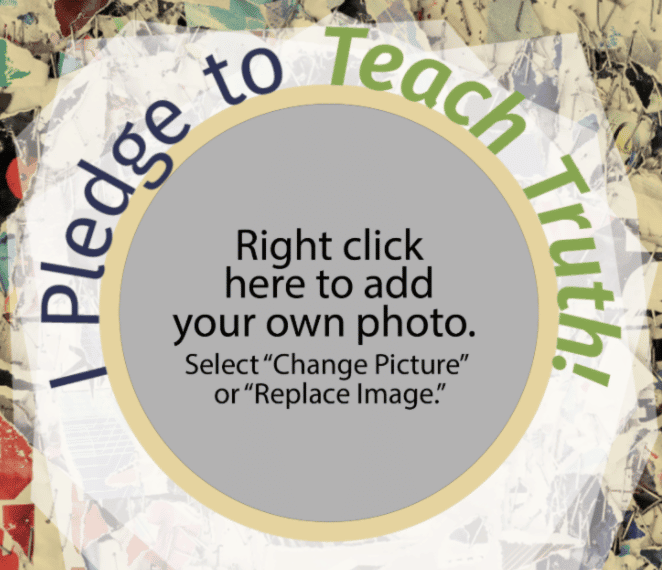
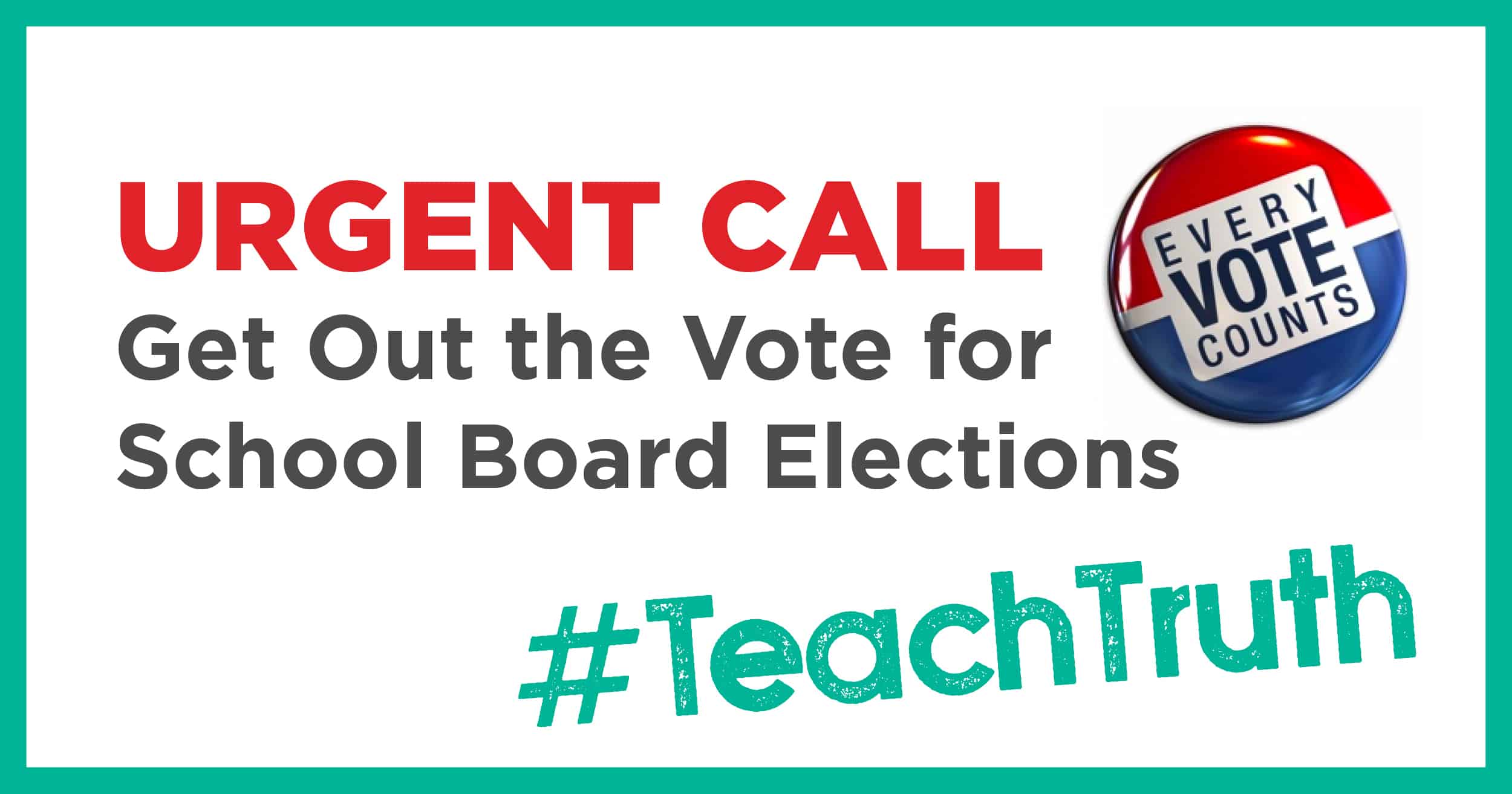
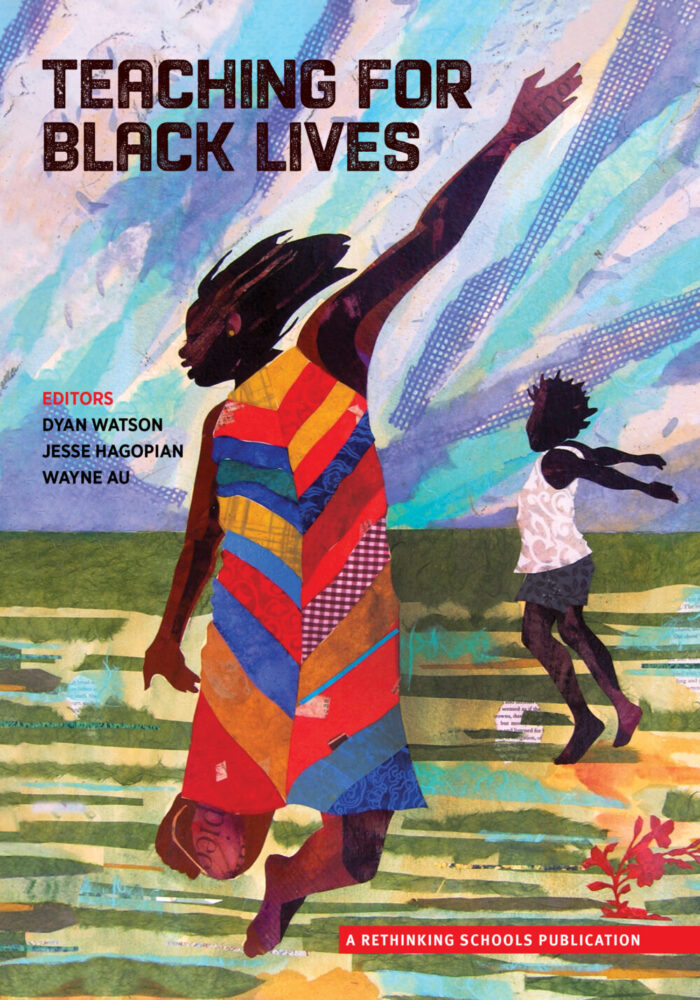





One of the most politically empowering and transformative assignments I devised at UMassBoston was a history research project that required my racially diverse, working class students to interview Afghan (or Iraqi) war veterans over the course of the semester.
Together, we discussed assigned readings that focused on both wars. We devised interview questions, and later brainstormed together about the issues and questions that arose during the interviews. Their interview findings were bound together in a packet, which became the basis for their research papers. A strength of this project for these predominantly working class and racially diverse students was that I (the professor) was not telling them what they should be finding; they were instead attempting to tell the untold story of the vets they interviewed. Many of them discovered that “their” vets had never before spoken to anyone about the war. The research project was enlightening and empowering both for the student interviewers and the interviewees –and for me. I have since published several books about transformative pedagogy